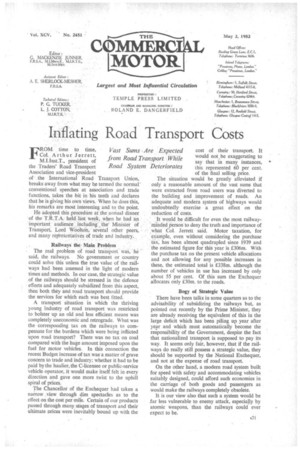Inflating Road Transport Costs
Page 23

If you've noticed an error in this article please click here to report it so we can fix it.
FROM. time to time, col. Arthur Jerrett, MJ.Inst.T., president of the Traders' Road Transport Association and vice-president of . the International Road Transport Union, breaks away from what may be termed the normal* conventional speeches at association and trade functions, takes the bit in his teeth and declares that he is giving his own views. When he does this, his remarks are most interesting and to the point.
He adopted this procedure at the .annual dinner of the T.R.T.A. held last week, when he had an important 'audience including they Minister of Transport, Lord Woolton, several other peers, and many representatives of trade and industry. _ Railways the Main Problem The real problem of road transport was, he said, the railways. No government or country could solve this unless the true value of the railways had been assessed in the light of modern times and methods. In our case, the strategic value of the railways should be stressed in the defence efforts and adequately subsidized from this aspect, then both they and road transport should provide the services for which each was best fitted.
A transport situation in which the thriving young industry of road transport was restricted to bolster up an old and less efficient means was completely uneconomic and retrograde. What was the • corresponding tax on the railways to compensate for the burdens which were being inflicted upon road transport? There was no tax on coal compared with the huge amount imposed upon the fuel for motor vehicles. In this connection the recent Budget increase of tax was a matter of grave concern to trade and industry; whether it had to be paid by the haulier, the C-licensee or public-service vehicle operator, it would make itself felt in every direction and gave one more twist to the uphill spiral of prices.
The Chancellor of the Exchequer had taken a narrow view, through dim spectacles as to the effect on the cost per mile. Certain of our products passed through many stages of transport and their ultimate prices were inevitably bound up with the cost of their transport. It would not be exaggerating to say that in many instances, this represented 66 per cent. of the final selling price.
The situation would be greatly alleviated if only a reasonable amount of the vast sums that were extracted from road users was diverted to the building and improvement of roads. An adequate and modern system of highways would undoubtedly exercise a great effect on the reduction of costs.
It would be difficult for even the most railwayminded person to deny the truth and importance of what Col. Jerrett said. Motor taxation, for example, even without considering the purchase tax, has been almost quadrupled since 1939 and the estimated figure for this year is £306m. With the purchase tax on the present vehicle allocations and not allowing for any possible increases in these, the estimated total is £338m. although the number of Vehicles in use has increased by only about 55 per cent. Of this sum the Exchequer allocates only £30m, to the roads.
Bogy of Strategic Value There have been talks in some quarters as to the advisability of subsidizing the railways but, as pointed out recently by the Prime Minister, they are already receiving the equivalent of this in the large deficit which has been piling up year after year and which must automatically become the responsibility of the Government, despite the fact that nationalized transport is supposed to pay its way. It seems only fair, however, that if the railways do really still possess a strategic value, they should be supported by the National Exchequer, and not at the expense of road transport.
On the other hand, a modern road system built for speed with safety and accommodating vehicles suitably designed, could afford such economies in the carriage of both goods and passengers as would make the railways completely obsolete.
It is our view also that such a system would be _far less vulnerable to enemy attack, especially by atomic weapons, than the railways could ever expect to be.




















































































